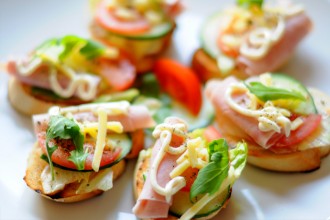January is the time when we all look to make a fresh start, maybe to lose a few pounds and to adopt a healthy routine. But it needs to be sustainable to have a real affect. Thrive expert Lucy Davies looks at some simple ways to ensure that your new year health routine lasts.
I’m aware that weight loss articles have been done to death and many people feel they’ve heard it all, tried it all and have (‘scuse the pun) had a gutsful, but please hear me out!
In case you’re under the impression that I’m some naturally thin, toned, hourglass young nutritionist about to tell you to eat less food and all will be well. I’m not. I’m 40, I wear the scars of childbirth x 3. In my teens I had an eating disorder, I’ve been thin, I’ve been 4 stone overweight, some bits of me are toned, some are stubbornly tone-resistant. Nowadays I maintain a healthy weight, I work as a holistic nutritionist and I’m relatively fit, plus, I eat a lot – including healthy but delicious cakes! I think I’m well qualified to write this article!
When I think about weightloss and all of the struggles that people have with achieving their goals. The first thing that springs to mind is the psychological part – how we feel about our bodies. This is important, because a healthy approach to self-esteem helps avoid that all too familiar “Well I just ate that massive chocolate bar when I shouldn’t have, so I may as well have that pie as well… I’m a failure, I’m fat, I’m ugly, what’s the point? I’ll never have thighs like Beyonce anyway, etc…”
Most of us either have or have had this conversation with ourselves and if we’re not careful, it can send us spiraling into weight loss depression, where we lose sight of our goals and the fact that this is not just about weight loss but about long term health – mental and physical.
Once you start listening to your body, you’re taking back the power of your health and weight into your own hands.
How can we expect to have a healthy body and make positive choices around food and lifestyle when we have a voice in our heads telling us we’re not worthy? Toxins don’t just sneak into our bodies through food, they’re also in our thoughts, environments, feelings and relationships. It’s definitely worth looking into all aspects of our life when it comes to making significant changes in our health.
Lets talk about guilt!
Guilt is such an influential emotion when it comes to food and weight loss, and while we can’t just flick a switch to turn it off, it might help to know that our cravings and their knock-on effects on our moods are actually a symptom of our physiology, not a cause (although it can become catch 22). We are massively conditioned and manipulated by mainstream media, supermarkets etc into believing that if it’s on the shelf it must be ok.
Guilt is such an influential emotion when it comes to food and weight loss
The adverts and packaging for example – on a bouncy loaf of bread might be reassuringly appealing. The reality is that that loaf can knock our blood sugar out of balance, and we’ll store the excess energy as fat, then when our blood sugar crashes an hour or two later, we’ll be tired, grouchy and completely convinced that the only remedy for this is more bread, chocolate or coffee etc.
Our health is absolutely our responsibility, but it is about so much more than willpower – so drop the guilt, the shame, the “I can’t do it”; YOU CAN. You’re listening to your body when you reach for the sugar and carbs – it’s just that your body’s giving you misguided messages. When you experience a blood sugar crash, your body needs energy. These are incredibly strong, unconscious survival messages you’re hearing, and they’re very hard to ignore. The trick here is to jump off the blood sugar roller coaster.
How? Protein can help! (although not too much as it could strain the kidneys) and eating little and often to start with will help too. Protein for breakfast helps stabilise blood sugar for the day.
Once you start listening to your body, you’re taking back the power of your health and weight into your own hands.
GI food charts are handy to have for reference, and thyroid health and iodine intake are worth checking too – as these heavily influence metabolism. (Please do take advice from a qualified nutritionist, dietician or your GP before beginning any new healthy eating regime).
I should also add that no matter how we choose to eat, we should always include lots of fruit and vegetables, as they’re gentle on the body whilst providing much of what we need – nutritionally. No need to go without the sweet treats though; just choose a healthier equally delicious alternative.
Lucy Davies is a qualified Naturopathic Nutritionist, she runs workshops, as well as writing for food & health magazines, recipe developing, catering, and consultancy work.










